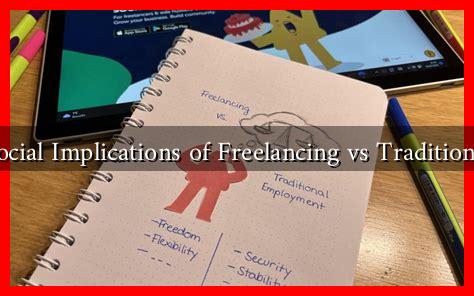-
Table of Contents
What are the Social Implications of Freelancing vs Traditional Employment
In recent years, the landscape of work has undergone a significant transformation, with freelancing emerging as a viable alternative to traditional employment. This shift has profound social implications that affect not only individual workers but also families, communities, and the economy at large. In this article, we will explore the social implications of freelancing compared to traditional employment, examining the benefits and challenges of each model.
The Rise of Freelancing
Freelancing has gained momentum due to technological advancements and changing workforce dynamics. According to a report by Upwork, as of 2021, 36% of the U.S. workforce was freelancing, a number that is expected to grow. This trend is driven by several factors:
- Flexibility: Freelancers enjoy the ability to choose their hours and work from anywhere, allowing for a better work-life balance.
- Diverse Opportunities: Freelancers can work on various projects across different industries, enhancing their skills and experience.
- Entrepreneurial Spirit: Many freelancers embrace the opportunity to be their own boss, fostering innovation and creativity.
Social Implications of Freelancing
While freelancing offers numerous advantages, it also presents unique social challenges:
1. Economic Insecurity
Freelancers often face financial instability due to the lack of a guaranteed income. Unlike traditional employees, they do not receive benefits such as health insurance, retirement plans, or paid leave. This economic insecurity can lead to:
- Increased Stress: The pressure to secure consistent work can lead to mental health issues.
- Limited Access to Resources: Freelancers may struggle to afford healthcare or retirement savings, impacting their long-term well-being.
2. Social Isolation
Freelancers often work alone, which can lead to feelings of isolation. Unlike traditional workplaces that foster social interactions, freelancers may miss out on:
- Networking Opportunities: Traditional employees often have access to professional networks that can lead to career advancement.
- Team Collaboration: The lack of teamwork can stifle creativity and innovation.
3. Impact on Community
Freelancing can also affect local economies and communities. While freelancers contribute to the gig economy, they may not always support local businesses as traditional employees do. For instance:
- Reduced Local Spending: Freelancers may spend less in their local communities if they work remotely and do not engage with local businesses.
- Job Displacement: The rise of freelancing can lead to job losses in traditional sectors, affecting community stability.
Benefits of Traditional Employment
Traditional employment offers a different set of social implications that can be beneficial for workers and society:
1. Job Security
Traditional employees typically enjoy greater job security, which can lead to:
- Stable Income: Regular paychecks provide financial stability and predictability.
- Access to Benefits: Employees often receive health insurance, retirement plans, and paid leave, contributing to overall well-being.
2. Community Engagement
Traditional employment fosters a sense of community and belonging. Employees are more likely to:
- Participate in Local Events: Engaged employees often contribute to local initiatives and events.
- Build Long-term Relationships: Working in teams allows for the development of strong professional and personal relationships.
Conclusion
The choice between freelancing and traditional employment carries significant social implications. Freelancing offers flexibility and diverse opportunities but comes with economic insecurity and social isolation. In contrast, traditional employment provides job security and community engagement but may lack the freedom that many modern workers seek. As the workforce continues to evolve, understanding these implications is crucial for individuals, employers, and policymakers alike. Balancing the benefits and challenges of both models will be essential in shaping a sustainable future of work.
For further insights into the gig economy and its impact on society, you can explore resources from the U.S. Bureau of Labor Statistics.

